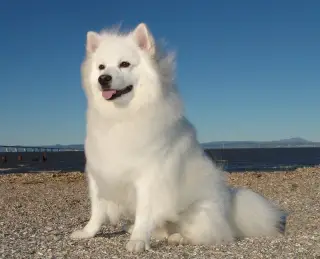American Eskimo Dog (Standard)

| Ease of Training | |
| Shedding | |
| Watchdog | |
| Guard Dog | |
| Popularity | |
| Size |
History
- He probably descended from the European spitzes: the white German Spitz, white Keeshond, white Pomeranian, Volpino Italiano, and possibly some Japanese Spitz
- In the 19th century in the United States small spitz-type dogs were found in German communities, these became known as the "American Spitz" (known know as the American Eskimo Dog)
- He was frequently used in circus acts in the late 19th century because of his agility and trainability
Personality and Behavior
- He thrives on love and being part of the family
- He is friendly, intelligent and alert
- He is very eager to please and learns commands quickly
- He is excellent at learning tricks
- He makes a good watchdog and will raise the alarm if he sees or hears a stranger at the door
- He can be quick to bark and needs to be told when to stop
- He is protective of his family but won't bite or attack
- He is highly agile and loves to play games
Training
- He's easy to train because he learns commands at an above average rate.
Shedding
- He sheds profusely! You will find a lot of hair in your home - stuck to your couch, carpets and clothes - and to just about everything else. You will be vacuuming regularly.
Grooming / Maintenance
- His medium-length coat only needs to be brushed occasionally. However, because it sheds profusely you may find yourself brushing it a couple of times a week, or even daily, to reduce the hair in your home (what you remove with a brush doesn't end up on the couch!).
Other varieties
- He comes in three sizes: Toy American Eskimo Dog, Miniature American Eskimo Dog, and Standard American Eskimo Dog
Photos
Submit a photo of your American Eskimo Dog (Standard)

